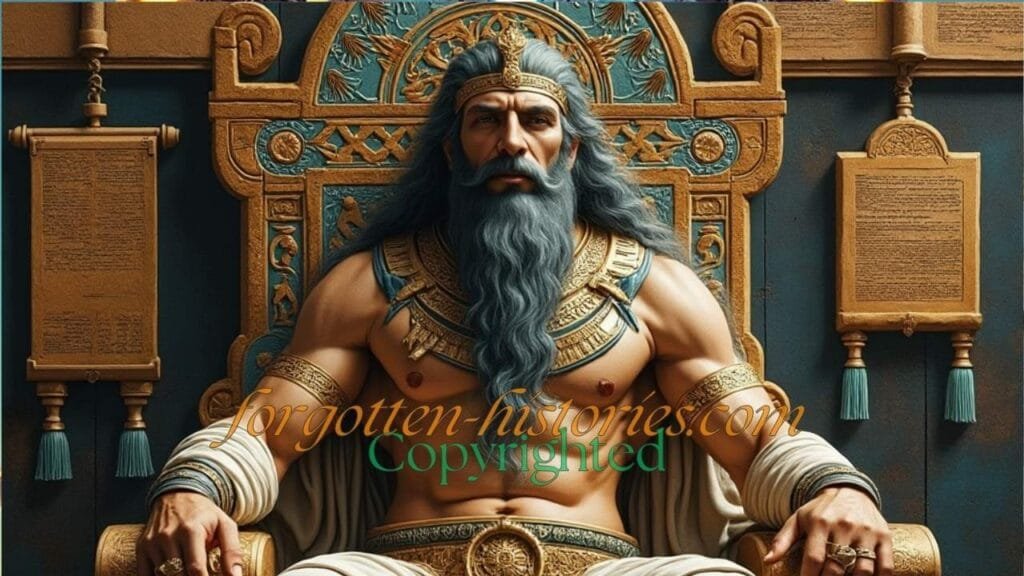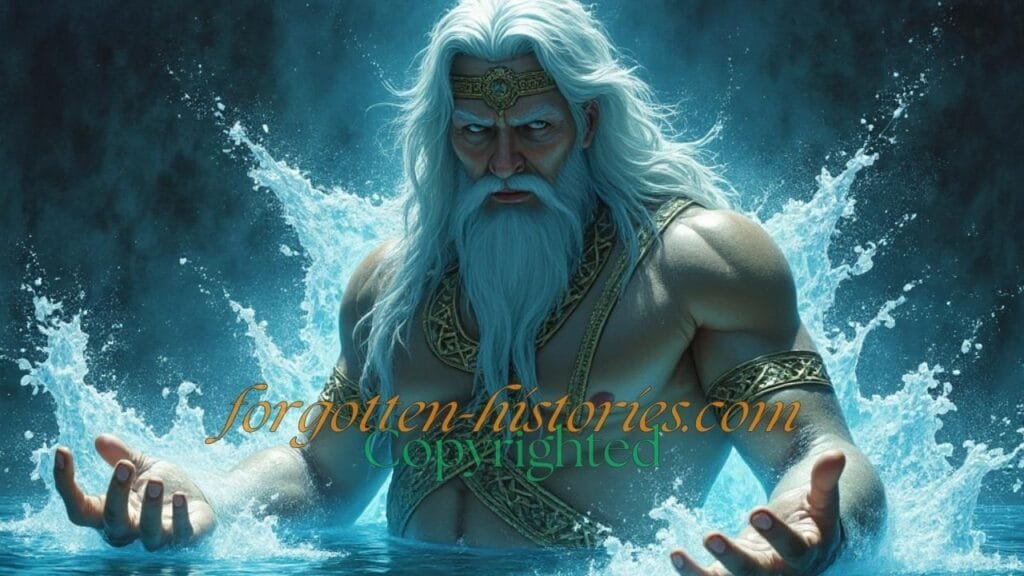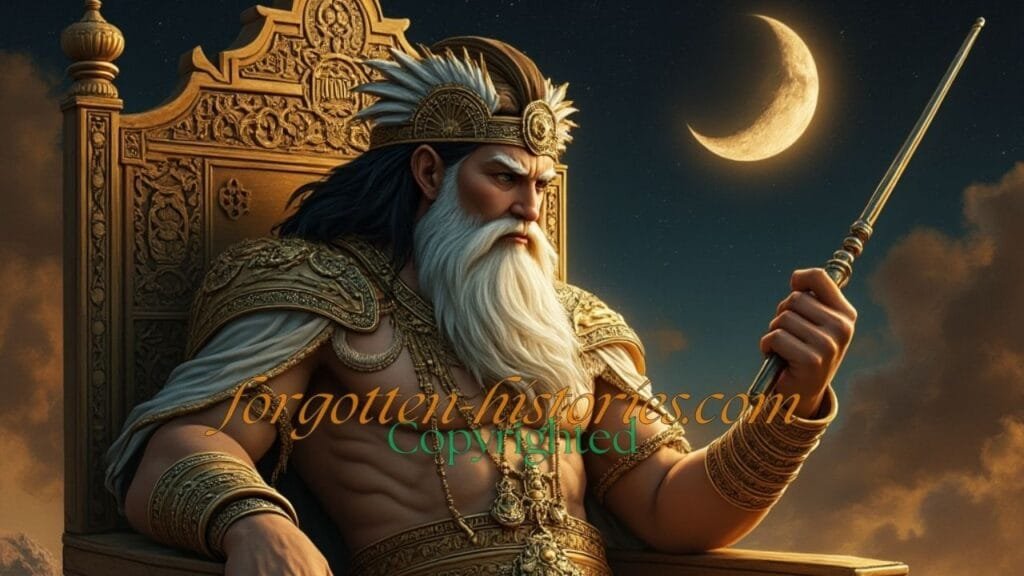Who is Enki?
Enki is one of the most important gods in Sumerian mythology. He is the god of wisdom, water, creation, and compassion. As an Anunnaki god, Enki’s influence extends across many ancient myths. He played a key role in protecting humanity, often using his intelligence and trickery to help people in times of need. Enki is revered as a god who values life, knowledge, and human well-being.
Enki is known for his wisdom, which he used to find solutions for complex problems. He was compassionate and protective, especially when it came to humanity’s survival. In many myths, Enki’s actions show his deep concern for people. He often went against other gods to help humanity, even when it risked his own safety.
Enki’s Origins and Role in Sumerian Mythology

Enki was the son of Anu, the sky god, and the half-brother of Enlil, the god of air and storms. He ruled over the domain of fresh water, which symbolized life and fertility. Enki’s wisdom made him a key figure in Sumerian religious practices. His compassion for humanity set him apart from other gods, especially his brother Enlil, who often viewed humans as a nuisance.
Enki’s role in Sumerian mythology is crucial. He is known as the god who brought wisdom and creativity to the world. His intelligence made him the god of crafts, magic, and invention. He was seen as the protector of humanity, often stepping in when other gods wished to punish humans. Unlike other gods who saw humans as inferior, Enki valued them and worked to ensure their survival.
Enki’s most famous myth involves his guidance of Atrahasis during the Great Flood. This event highlights his deep care for humanity. While other gods, like Enlil, sought to destroy mankind, Enki’s wisdom and compassion led him to save the humans who were faithful and kind.
Iconography and Symbols of Enki
Enki’s physical appearance in ancient depictions is highly symbolic. He is often shown as a bearded man wearing a horned cap and flowing robes. One of the most iconic symbols associated with Enki is the flowing water that runs from his shoulders. This visual representation connects him to his domain over fresh water, which was seen as a source of life.

The flowing water from Enki’s shoulders represents life itself. Water was a vital element in ancient Mesopotamian culture. It symbolized fertility, sustenance, and the life-giving forces of nature. Enki was considered the god who controlled water, making him essential to the survival of humans and the earth.
Enki’s symbols, the fish and the goat, are also deeply symbolic. The fish represents fertility and abundance, while the goat represents the male principle of life. His name, Enki, translates to “Lord of the Earth,” further reflecting his importance as a god of creation and life. These symbols also show his connection to fertility, agriculture, and the balance of nature.
Enki’s Role in the Atrahasis and the Great Flood
One of the most significant myths involving Enki is the Atrahasis, which recounts the Mesopotamian version of the Great Flood. The gods had grown frustrated with humanity, believing that their creation was too noisy and troublesome. To solve this, Enlil, the king of the gods, decided to send a great flood to wipe out humanity.
However, Enki, known for his compassion, defied Enlil’s command. He secretly warned Atrahasis, a wise and righteous man, of the impending flood. Enki instructed Atrahasis to build a large boat to save himself, his family, and two of every animal species. He gave Atrahasis the wisdom needed to survive the coming disaster.
When the flood came, Atrahasis and the survivors were the only humans left alive. This myth highlights Enki’s role as a protector of humanity, even when it meant going against the will of the other gods. Enki’s actions ensured the continuation of life on Earth, showing his dedication to the survival and well-being of humans. His wisdom saved humanity from destruction and ensured the future of the earth.
Creation of Humanity
Enki played a crucial role in the creation of humanity. The gods were burdened with hard labor, and they sought a solution to ease their workload. Enki proposed creating a new race of beings—humans—who would take over the physical labor required to maintain the Earth. Enki’s decision was based on his belief that humans could serve the gods by doing the work they found tiresome.

Though not always seen as a direct creator of life, Enki’s influence on humanity’s creation was as vital as other Anunnaki gods. His actions allowed humanity to thrive, ensuring that the gods could rest while humans took on their tasks. Enki’s involvement in this myth further emphasizes his role as a god who cared for humanity’s needs, both physically and spiritually.
In the myth, Enki’s role is not just as a creator but as a mediator. He balanced the needs of the gods with the survival of humanity. Unlike other gods, Enki didn’t see humans as mere workers but as beings worthy of protection and care. His actions show his deep compassion and belief in the importance of human life.
Comparing Enki to Other Wisdom and Creation Deities
Enki shares many similarities with other gods of wisdom and creation found in different mythologies. For instance, the Egyptian god Thoth is often associated with wisdom, writing, and knowledge. Like Enki, Thoth was revered for his intellect and his ability to aid humanity. Similarly, in Greek mythology, Prometheus is known for his gift of fire to humanity, symbolizing the transfer of knowledge and power to humans.
While each of these gods has unique attributes, they share a common theme: the desire to help or protect humanity. Enki’s compassion for humans and his wisdom reflect a similar archetype seen in many cultures, making him a timeless symbol of benevolence and intelligence. Gods like Enki, Thoth, and Prometheus are remembered not just for their divine powers but for their willingness to aid humankind in times of need.
These deities also symbolize the transfer of knowledge from the divine to the mortal. This exchange between gods and humans is central to many myths across cultures. Enki’s wisdom, like that of Thoth or Prometheus, helped shape the course of human civilization and continues to inspire us today.
Enki in Modern Culture and Interpretations

In modern times, Enki’s image and role have been reinterpreted in various ways. Some people connect Enki to the ancient astronaut theory, a concept that suggests advanced beings from other worlds influenced the development of early human civilizations. According to this theory, Enki’s wisdom and technological prowess could be seen as signs of extraterrestrial intervention.
Enki also appears in popular culture, particularly in literature and speculative fiction. Writers often draw on Enki’s association with wisdom, creation, and protection to create characters who embody these qualities. These modern references continue to highlight Enki’s enduring legacy as a god of compassion, intelligence, and life.
Enki’s themes of wisdom, compassion, and creation resonate with many people today. His stories continue to be told and reinterpreted, showing how deeply his legacy has impacted human culture. Whether as a symbol of ancient wisdom or as a figure of divine protection, Enki’s influence remains strong.
Conclusion: Enki’s Enduring Legacy
Enki’s legacy endures not only in ancient mythology but also in modern interpretations. He remains a symbol of wisdom, protection, and the nurturing of humanity. Enki’s compassion for humans, his defiance of harsher gods, and his role in both creation and the survival of humanity make him a timeless figure. His myths continue to inspire, reminding us of the importance of knowledge, kindness, and the protection of life.
Enki’s role in the survival of humanity and the preservation of wisdom serves as a reminder of the value of compassion and intelligence in today’s world. His stories offer guidance for anyone seeking to protect life, nurture growth, and stand up for what is right.
Pingback: Who Was Anu? The King of the Gods in Sumerian Mythology
Pingback: Sumerian creation myth and Enuma Elish explained - Forgotten-Histories.com
Pingback: The Epic of Atrahasis: The Original Flood Story Before Noah’s Ark
Pingback: The Anunnaki: Survivors of a Lost Civilization? - Forgotten-Histories.com